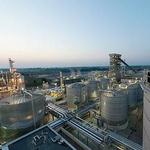 全世界第一座利用農業殘餘和能源作物生產生物乙醇的商業生物精煉廠,在義大利北部正式啟用。全面營運後,每年將能提供歐洲市場7500萬公升的生物乙醇。
全世界第一座利用農業殘餘和能源作物生產生物乙醇的商業生物精煉廠,在義大利北部正式啟用。全面營運後,每年將能提供歐洲市場7500萬公升的生物乙醇。
義大利經濟發展部長薩諾納托(Flavio Zanonato)、當地與地區官員、歐盟委員會代表,以及世界各地500多名相關人士都出席了10月9日當天的竣工典禮。
這座精煉廠位於北義大利的克雷申蒂諾(Crescentino)市郊,是利用麥稈、稻稈和蘆竹(Arundo donax)──一種生長在邊際土地(marginal land,耕地與非耕地的界限)的高能源作物,以及將這些植物材料轉換成燃料的酵素,來生產纖維素乙醇。
「不斷進化的生質燃料市場代表經濟轉型以及環境和社會的新契機,這座精煉廠的啟動可說是為化工領域的綠色革命鋪路。」貝塔再生能源的董事長兼執行長吉索爾菲(Guido Ghisolfi)表示,「我們將繼續在世界各地拓展貝塔再生能源的核心技術,全球市場的需求讓我們充滿信心。」
該精煉廠是貝塔再生能源(Beta Renewables,義大利托爾托納的纖維素生質能源公司)與全球最大工業酵素生產商諾維信公司(Novozymes,總部設在丹麥)合作促成。這兩家公司在2012年10月形成策略聯盟,諾維信公司成為貝塔再生能源當前與未來纖維素生質燃料計畫中,酵素供應商的首選。
「今天的竣工典禮意味我們往前邁進一大步,真正是先進生質燃料新時代的開始。」諾維信公司的執行長尼爾森(Peder Holk Nielsen)表示,「這座精煉廠借重諾維信公司的酵素科技,把農業剩餘轉變為數百萬公升、低碳排放的綠色燃料,量產纖維素乙醇將不再是遙遠的夢想。此時此刻夢想實現了,我們已為大規模商業化做好準備。」
貝塔再生能源表示,運用他們的Proesa ™工程和生產技術,再搭配諾維信公司發展的Cellic ®酵素,是「目前最具成本競爭力的先進生質燃料平台。」Proesa屬於所謂的「第二代」技術,它能運用木質纖維素生質裡的糖獲得燃料和其他化學品。比起石油和天然氣等化石燃料,它不但能降低溫室氣體排放,還具有價格上的優勢。
德太集團(Texas Pacific Group)自2011年以來已投入2億多美元的資金研究和發展。「對纖維素乙醇感興趣的投資者經常詢問這個技術何時能夠商業化。」吉索爾菲表示,「比起傳統的生質燃料,Proesa現在就能讓客戶大規模生產更具價格競爭力的第二代生質燃料。」生產乙醇的過程中,需從植物生質(biomass)取得木質素聚合物,它將會是附屬發電廠的燃料,藉此產生足夠電力供應精煉廠的需求。如果有多餘的綠色電力,將會出售給當地的電力網絡。
「我們提供完整的產品,讓纖維素生質燃料計畫有利可圖,而且可成功複製,」吉索爾菲表示,「隨著全球第一個商業化的精煉廠在義大利北部建設並運作,我非常期待這個令人興奮的歷程──建立一個全新且前景看好的行業。 」
彭博新能源金融公司(Bloomberg New Energy Finance)最新的研究指出,到了2030年,轉化農業殘餘為先進生質燃料將在世界各地創造數百萬個工作機會、促進經濟成長、減少溫室氣體排放與確保能源安全。
不過要實現這個願景,吉索爾菲和尼爾森均表示,政府的支持不可或缺,並必須加快部署第二代生物精煉廠的腳步。「政策制定者現在必須釋放明確的訊息,鼓勵投資第二代生質燃料。」尼爾森說,「各方面穩定且可執行的指令、對收集農業殘餘的獎勵和投資興建大型精煉廠均有助推動永續,包括減少溫室氣體排放、活絡經濟和提供能源安全。繼續依賴化石燃料是行不通的。」
義大利政府聽到這些建言了。經濟發展部長薩諾納托和環境部長奧蘭多(Andrea Orlando)在精煉廠竣工當天,宣布促進設立新生物煉製廠的法令。該法令簡化授權生物煉製廠興建的程序,不但促進設廠,也有利企業投資。
奧蘭多表示,「使用這種類型的生質燃料是達到歐洲2020年規範(生質燃料需達運輸用燃料的10%)的解決方案。政府幾個月前成立了『跨部會經濟計畫委員會』(the Interministerial Committee for Economic Planning, CIPE),目標是減少經濟活動排放的二氧化碳、訂定法規促進再生能源和能源使用效率,以及低排碳車輛、綠色化學與第二代生質燃料的發展。」
The world’s first commercial-scale refinery to produce bioethanol from agricultural residues and energy crops has opened in northern Italy. When fully implemented, the system will provide 75 million liters of bioethanol annually for the European market.
Present at the opening Wednesday were Italy’s Economic Development Minister Flavio Zanonato, local and regional officials and representatives from the European Commission, as well as more than 500 stakeholders from around the world.
Situated in fields outside the city of Crescentino, the plant uses wheat straw, rice straw and arundo donax, a high-yielding energy crop grown on marginal land to produce cellulosic ethanol, using enzymes to convert the plant material into fuel.
The facility is the result of a collaboration between Beta Renewables, a cellulosic biofuels company based in Tortona, Italy, and Novozymes, the world’s largest producer of industrial enzymes, headquartered in Denmark.
The two companies formed a strategic partnership in October 2012, making Novozymes the preferred enzyme supplier for Beta Renewables’ current and future cellulosic biofuel projects.
“The advanced biofuels market presents transformational economic, environmental and social opportunities, and with the opening, we pave the way for a green revolution in the chemical sector,” said Beta Renewables Chairman and CEO Guido Ghisolfi. “We will continue to commercially expand Beta Renewables’ core technology throughout the world, and we are very confident at this stage given the demand we see around the globe.”
“The opening today presents a leap forward and is truly the beginning of a new era for advanced biofuels,” said Novozymes CEO Peder Holk Nielsen. “Here, at this plant, enabled by Novozymes’ enzymatic technology, we will turn agricultural waste into millions of liters of low-emission green fuel, proving that cellulosic ethanol is no longer a distant dream. It is here, it is happening, and it is ready for large-scale commercialization.”
Lignin, a polymer extracted from biomass during the ethanol production process, fuels an attached power plant, which generates enough power to meet the facility’s energy needs. Any excess green electricity will be sold to the local grid.
Since 2011, more than US$200 million has been invested in research and development of the technology used to produce cellulosic ethanol at the Crescentino facility with financing from the Texas Pacific Group.
Beta Renewables says its Proesa™ engineering and production technology used with Novozymes’ Cellic® enzymes represent “the most cost-competitive advanced biofuels platform in existence today.”
Proesa belongs to the so-called “second-generation” technologies which allow the use of the sugars present in lignocellulosic biomass to obtain fuel and other chemicals with lower greenhouse gas emissions and at competitive costs compared to fossil fuels such as oil and natural gas.
“Investors interested in cellulosic ethanol often ask when the technology will be ready at commercial scale,” said Ghisolfi. “PROESA enables customers to produce advanced biofuel at a cost-competitive price relative to conventional biofuels – at large-scale and today.”
“Our complete offering makes cellulosic biofuel projects bankable and replicable,” Ghisolfi said. “With the world’s first commercial plant up and running here in northern Italy, I very much look forward to an exciting journey of establishing an entirely new, and very promising, industry.”
A recent study by Bloomberg New Energy Finance concludes that transforming agricultural residues into advanced biofuels could create millions of jobs worldwide, economic growth, reduction of greenhouse gas emissions, and energy security by 2030.
But before this can occur, Ghisolfi and Nielsen say government support is necessary to accelerate the deployment of next-generation biorefineries.
“Policy makers now need to send clear signals to encourage the necessary investments in advanced biofuels,” said Nielsen. “Stable and predictable blending mandates, incentives for the collection of agricultural residues, and investment support for the first large-scale plants will help move the world substantially in terms of reducing greenhouse gases, stimulating economies, and providing energy security. Continued reliance on fossil fuels is not viable.”
Italy’s government is hearing this message. Zanonato and Environment Minister Andrea Orlando responded on the facility’s opening day with a decree that promotes the creation of new biorefineries. The decree simplifies the procedures for authorizing biorefineries, with the dual purpose of promoting them in Italy and facilitating investments in the industry.
“The use of this type of biofuel,” said Orlando, “is the solution to get to reach the target of 10 percent to 2020 European directive. The government is working to implement the plan, approved in recent months by the CIPE [the Interministerial Committee for Economic Planning], the decarbonization of the economy and the reduction of CO2 emissions, encouraging measures to promote renewable energy and energy efficiency, low-emission mobility, green chemistry and 2nd generation biofuels.”






